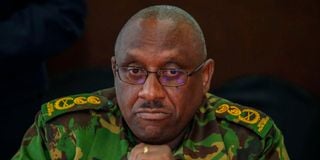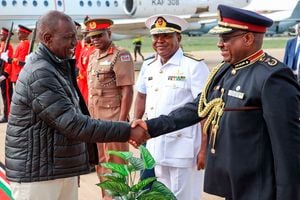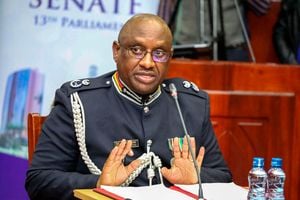
Former Inspector-General of Police Japhet Koome.
Until October 4 last year, everything between President William Ruto and Inspector General of Police Japhet Koome, who resigned on Friday, was assumed to be going on well.
This was until President Ruto held a high-power meeting at State House Nairobi.
During this key state function, the absence of the IG from this event lifted the lid on the frosty underlying issues between him and the president.
The President received the task force report from former Chief Justice David Maraga's team that had undertaken a study on what was ailing the National Police Service, Prisons and National Youth Service.
All top security chiefs including the Interior Cabinet Secretary Kithure Kindiki, Deputy Inspector General Noor Gabow and Douglas Kanja were invited to this event. Prisons boss Brigadier (Rtd) John Kebaso Warioba was also present.
In the changes President Ruto announced following Mr Koome’s resignation, Mr Kanja was named acting Inspector General, while Brig (Rtd) Warioba was sent on terminal leave, pending retirement, with his place taken by Patrick Mwiti Arandu as the Commissioner General of Prisons.
Mr Gabow has been redeployed within the public service, while Eliud Langat has been named Acting Deputy Inspector General of the Kenya Police Service, and Mr James Kamau as Acting Deputy Inspector General, Administration Police Service.
General Service Unit
Those picked by the National Police Service Commission for various roles are Mr Ranson Lolmodooni Commandant, General Service Unit (GSU) Mr Gilbert Masengeli Commandant, Administration Police Training College (APTC), Embakasi. Mr William Yiampoy Director of Operations, Police Headquarters, and Mr Kainga Mathiu Commandant, National Police Leadership Academy (NPSA), Ngong.
Back to the State House meeting last year.
Even as the IG then insisted that everything was okay between him and his boss, some sources within the state security circles were categorical that it was just a matter of time before Mr Koome was kicked out of the corner office at Jogoo House.
The sources said the President and Koome did not have the much-needed chemistry between a man and his boss.
National Police Service Spokesperson Dr Resila Onyango insisted that there was nothing wrong with the IG failing to attend the State House meeting.
Speculation was rife that Koome had not been invited to the State House meeting because of his icy relationship with the President.
Dr Onyango, however, dismissed the claim that the IG and the president did not have the right chemistry.
She explained that the IG had travelled to Meru where he was attending another meeting.
Sources intimated that lately, in the days leading up to his resignation, Mr Koome had been left to largely operate without an audience with the Head of State.
Noordin Haji, the National Intelligence Service (NIS) boss, was the man who’d been at the centre of security plans, with Mr Koome left to run the operations.
In an interview with the media at State House, President Ruto insisted that he had granted independence—financial and operational—to the police in what was seen as laying the blame squarely on Mr Koome for any inefficiencies.
Keen observers were quick to note that this was not the first time that Koome was missing from key events held at State House.
The police chief was also absent during the visit by King Charles and Queen Camilla on October 31.
All other top security chiefs including then Chief of Defence Forces General Francis Ogolla (now deceased) were present at the welcome ceremony for the king and queen in State House.
With time, things have been moving from bad to worse.
Mr Koome was again in the spotlight of the president when the anti-Government protest kicked off.
Political leaders from both the government and the opposition questioned why Koome had decided a no-show when the country was on fire.
Poor show
The political leaders claimed that Koome’s failure to speak during the crisis had led to a poor show of the government’s position on security matters.
Last Wednesday, at the height of the anti-finance protests, the call for Koome to resign gained momentum.
Some senators called on the president to dismiss the IG for failing to protect Kenyans during the protest.
The senators who spoke during a meeting of the senate put Koome on the spot following cases of brutality meted out to the demonstrators by the police.
Kakamega senator Bonny Khalwale said: “The president should quickly restructure the security organs by firing people, the IG included,” said Khalwale.
Kitui Senator Enoch Wambua also called on the president to sack Koome.
Said Wambua: “Talking about incompetence and lack of capacity, the Inspector General of Police is the embodiment of lack of capacity to lead the Kenya Police Service. Mr Koome must leave office immediately for this country to enjoy peace and tranquillity,”
Nandi senator Samson Cherargei, further called out Koome for his silence since the start of the anti-tax demonstrations in the country.
Cherargei told senators that Koome had failed to update the country regularly on the security situation at the time of the demonstrations.
“….The only time the Inspector General of Police has responded is when he saw allocations of fatalities. He sent a statement,” Cherargei said.
On June 21, ODM leaders called on the IG to resign.
In a press statement in Nairobi, the Azimio leadership said there was a pattern of violence by security officers and that the violence meted out to the demonstrators was not justified.
The Azimio leaders also called for the resignation of Nairobi police Chief Adamson Bungei for failing to protect the demonstrators.
News that the President is now considering re-organising the government has now fuelled speculation on the fate of the IG who has continued to maintain a low profile even as politicians call for his sacking.
The IG cannot be fired by the President. The office of the IG enjoys a security of tenure for the four years that he will be in office.
Having survived past threats to his career, Mr Koome's luck has been running thin in his last days in office. In an interview with the Nation a week ago, Mr Koome denied claims that he had been summoned to State House over the manner in which the police had dealt with the largely peaceful demonstrators. At least 39 people are said to have been shot and killed by the police during the protest according to statistics provided by human rights groups.
Last June, Interior CS Kithure Kindiki had warned Koome and the National Police Service Commission chairman that they risk being fired over incessant fights.
At the time when Kindiki issued this warning, Mr Koome and NPSC chairman Eliud Kinuthia were engaged In a protracted fight over the hiring of civilian staff by the NPSC.
So serious was this fight that 51 civilians who were interviewed and hired by the Eliud Kinuthia-led NPSC were locked out of their offices.
The employees were reporting to their new workstation for the first time after their appointment. When they arrived at the Jogoo house offices, they were turned away by security officers who said they were acting on instruction from a top security chief.
Mr Kinuthia issued a press statement on the matter and accused the IG of issuing orders to police officers manning gates at Jogoo House not to allow the new staff to access their offices.
The fight between the two police bosses reportedly found its way to State House.
What followed was a series of mediation talks even as a section of the police chiefs impressed on the president to deal firmly with the issue.
Since Monday, social media platforms have been awash with details that Mr Koome was living on borrowed time. His tenure as the IGP came to an end on Friday, July 12 afternoon.









